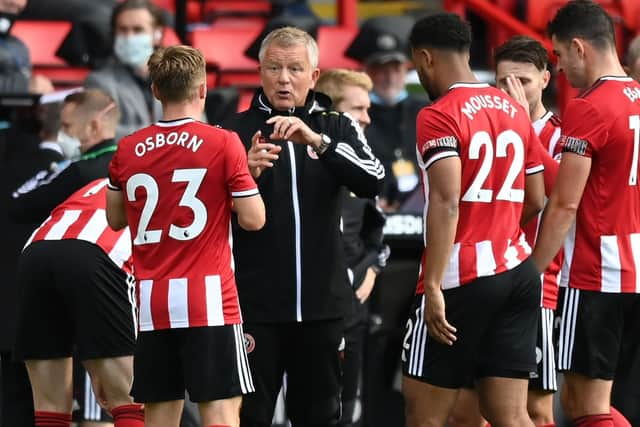James Shield's Sheffield United Column: Why The Blades must revert to type during this summer's transfer window
and live on Freeview channel 276
The figures, compiled by Business Rescue Expert, a management consultancy and insolvency practice based in Darlington, estimated that playing behind closed doors saw Sheffield United lose £6.2m in things like ticket, programme, food and drink sales. A simply staggering sum given they only had five home games remaining when competition resumed following a three month break towards the end of June. And an amount I’d be prepared to wager the price of 10 vegetable balti pies - if you haven’t tried one, you really should - does not reflect the entire amount either when things like sponsorship reimbursements and reduced solidarity payments are factored in either. Not even the most frugal of directors would have considered such an event - a proper force majeure if ever I witnessed one - when they set their pre-season budgets.
Probably the biggest drop, however, should be measured in points rather than pounds. United’s team, whose relationship with its support base is the envy of the division, would certainly have collected more than 11 from the 10 games they played during Project Restart. Six more, or only four if you count the two Hawkeye robbed them of during June’s visit to Aston Villa, would have seen Chris Wilder’s men pip Tottenham Hotspur to a Europa League place. Instead they finished ninth - still a remarkable achievement for a newly promoted team - and became the first side, thanks to an unforgivable technological failure, to win a goalless draw.
Advertisement
Hide AdAdvertisement
Hide AdBut enough of that. Back to BRE’s findings, which calculated that Manchester City were the biggest victims of coronavirus - seeing £23.9m going down the swanny. Again, it is enough to make you wince. Until you consider that Pep Guardiola’s employers, the City Football Group, (or Abu Dhabi to you and me), banked £400m when Etihad Airlines - surprise, surprise - agreed to sponsor their stadium for a 10 year period.
“I think it’s fair to say we’ve lost a fair chunk of change,” Wilder admitted recently, before United’s owner HRH Prince Abdullah bin Musa’ad bin Abdulaziz Al Saud was forced to pay around £40m to acquire their property assets to comply with the terms of the High Court ruling which awarded him control. “I’m not embarrassed to say that. It’ll probably be somewhere between £20m and £30m I should imagine, from the football club’s point of view, but perhaps that is a question for Steve (Bettis, United’s chief executive). Does that mean it’s going to affect budgets? Yes, that’s going to be the case and also what else is going on with the transfer of ownership from one owner to another.”
“I accept that it’s up to me to find a way round it,” Wilder continued. “I will give my best in order to try and make the group better for next year, which we need to do. You can’t stand still in this division, there’s no doubt about it, as we’ve seen glimpses of since the return (of games).
“Nobody really knows when fans are going to be allowed back in so, from a commercial aspect, that makes things really difficult to plan for. And we rely heavily on things like that. Again, for the same reasons, how they are going to be affected in the future, nobody really knows.”
Advertisement
Hide AdAdvertisement
Hide AdUnited’s coaching staff will have to work doubly hard to ensure the squad which starts the 2020/21 campaign is stronger than the one which faced AFC Bournemouth on the opening weekend of last term. Despite the obvious hurdles, United’s business experts must also come to the fore in order to lessen the shortfall - identifying and then striking more lucrative deals than they were able to secure in the past, when pundits and former professionals were tripping over themselves to predict that an immediate return to the Championship beckoned.


Unlike Guardiola, Liverpool’s Jurgen Klopp or even, despite his protestations to the contrary, Ole Gunnar Solskjaer of Manchester United, the pot of money Wilder was initially handed to recruit new players during this summer’s transfer window will shrink because of the global health crisis. Guardiola, it must be noted though, was tragically affected when his mother Dolors succumbed to the disease. At this stage of their development, and without representatives of a sovereign wealth fund, North American sporting conglomerate or Russian oligarch occupying the boardroom, United do not have the means to carry on as normal.
For that reason, and despite indications following the arrival of Sander Berge that they are broadening their horizons when it comes to sourcing new talent, it seems advisable that they revert to type and focus on identifying reinforcements from the English Football League. It is a policy which, if Wilder is to be given the best opportunity of building upon the progress of the past 12 months, must be abandoned moving forward. But one that has served them superbly up to now, with the likes of John Fleck, John Egan, Jack O’Connell and Enda Stevens all impressing as United were promoted from the Championship and then continuing to improve once reaching the top-flight.
It is a market Wilder, his assistant Alan Knill and recruitment guru Paul Mitchell know inside out. And therefore the risks of making a mistake - which in these challenging times would be difficult to rectify - are reduced. This proposition might not excite many. But it is sensible.
